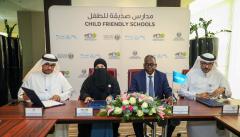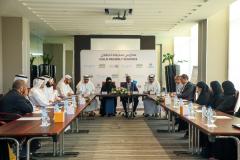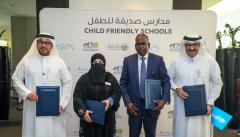Sharjah And UNICEF Launch Child-Friendly Schools Project

Sharjah Baby Friendly Office (SBFO), the entity implementing the Sharjah Child-Friendly City project, has joined forces with Sharjah Private Education Authority (SPEA) and Sharjah Education Council (SEC) and to launch the ‘Child-Friendly Schools’ (CFS) initiative, in collaboration with the United Nations Children’s Fund (UNICEF).
The purpose of the project is to move schools and education systems in the emirate of Sharjah progressively towards quality global standards, addressing all elements that influence the wellbeing and rights of a child as a prime beneficiary of the teaching process, while improving other aspects of school functions in the process.
It will address four key elements: Raising awareness on child rights, supporting children’s participation in school and community initiatives, protecting children from all forms of violence and abuse, and the integration of children with special needs into mainstream education.
The first stage of the project will target public and private nurseries as well as private schools in Sharjah.
The announcement was made upon the signing of an official agreement between the organising entities and UNICEF recently. The signing ceremony was attended by Al Tayyeb Adam, UNICEF Representative of the Gulf Area Office; Dr. Hessa Khalfan Al Ghazal, Executive Director of the Sharjah Baby Friendly Office; Ali Al Hosani, Director of Sharjah Private Education Authority; and Mohammed Al Mulla, Secretary-General of Sharjah Education Council.
The Child-Friendly Schools project is one of the outcomes of an MoU signed last November by Sheikha Bodour bint Sultan Al Qasimi, Chairperson of Sharjah Baby Friendly Office and Khairat Kabalari, UNICEF Regional Director for the Middle East and North Africa, in the presence of His Highness Sheikh Dr. Sultan bin Muhammad Al Qasimi, Supreme Council Member and Ruler of Sharjah.
The MoU underlines a set of objectives for Sharjah to develop an integrated system to instil children’s rights in schools, families, and the community at large, through an annual operations plan.
The organising entities have announced that they are in the process of preparing and finalising the project criteria in cooperation with all partners based on best international practices. The executive plan and technical support programmes for schools will be announced by the beginning of the upcoming academic year.
During the signing ceremony, Al Tayyeb Adam, UNICEF Representative of the Gulf Area Office, commented: “As part of the Sharjah Child-Friendly City project, and a continuation of the successes of previous years, UNICEF has signed the action plan for 2019-2020. It contains an important pillar which is to develop the criteria and guidelines for the child-friendly schools project. I consider it a huge accomplishment for the emirate, and in line with the directives of His Highness Dr Sheikh Sultan bin Muhammad Al Qasimi, Supreme Council Member and Ruler of Sharjah to protect children’s rights.”
Dr. Hessa Khalfan Al Ghazal said: “Our mission aligns with the vision and directives of His Highness the Ruler of Sharjah to unify efforts to invest in children, safeguard their rights and maintain their safety and well-being.
“The project build upon Sharjah’s remarkable international achievements, after being named the world’s first ‘Baby-Friendly City’ by UNICEF and World Health Organisation (WHO) in 2015, and a ‘Child-Friendly City’ by UNICEF last year.”
“The importance of this project stems from the fact that schools today have just about the same impact on children as the family. School are where children spend most of their times studying, playing, doing sports and art activities and building new friendships,” Al Ghazal added.
Al Ghazal stressed that one of the key pillars of the project is the integration of children with special needs and disabilities into mainstream education systems. To this extent, SBFO and SPEA recently hosted Decirèe Jokinen, specialist on disabilities at the City of Stockholm Education Administration in Sweden, who reviewed integration strategies of private schools in Sharjah and submitted recommendations to improve their effectiveness.
Ali Al Hosani, Director of SPEA said: “Education is a key driver of development and prosperity. Children feel more comfortable in schools if they are provided with quality and advanced learning tools, and a safe environment that ensures their emotional, physical and social health and well-being.”
He added: “The project will target a number of Sharjah’s private schools and nurseries that are supervised by SPEA. Our involvement in this project is in alignment with the directives of His Highness the Ruler of Sharjah, where we will strive to enhance the learning environment for all children in order to enable them utilize the knowledge and resources available in their schools.”
Mohamed Al Mulla, Secretary General of Sharjah Education Council expressed his pride in this partnership, stressing that the ‘Child-Friendly Schools’ project aligns with the Council’s strategic plan to develop the early childhood education sector in the emirate.
Al Mulla added that the Council will implement the initiative in all public nurseries which are under its supervision. He noted that the Council’s five-year plan is focused on early learning and child development, as childhood is the stage where children start to develop their personality and cognitive skills. He also stressed the importance of joining efforts to provide all children a comprehensive and positive educational environment that contributes towards building balanced personalities, in accordance with the Council’s mission and goals, and cultural and national values that meet the highest quality standards.




